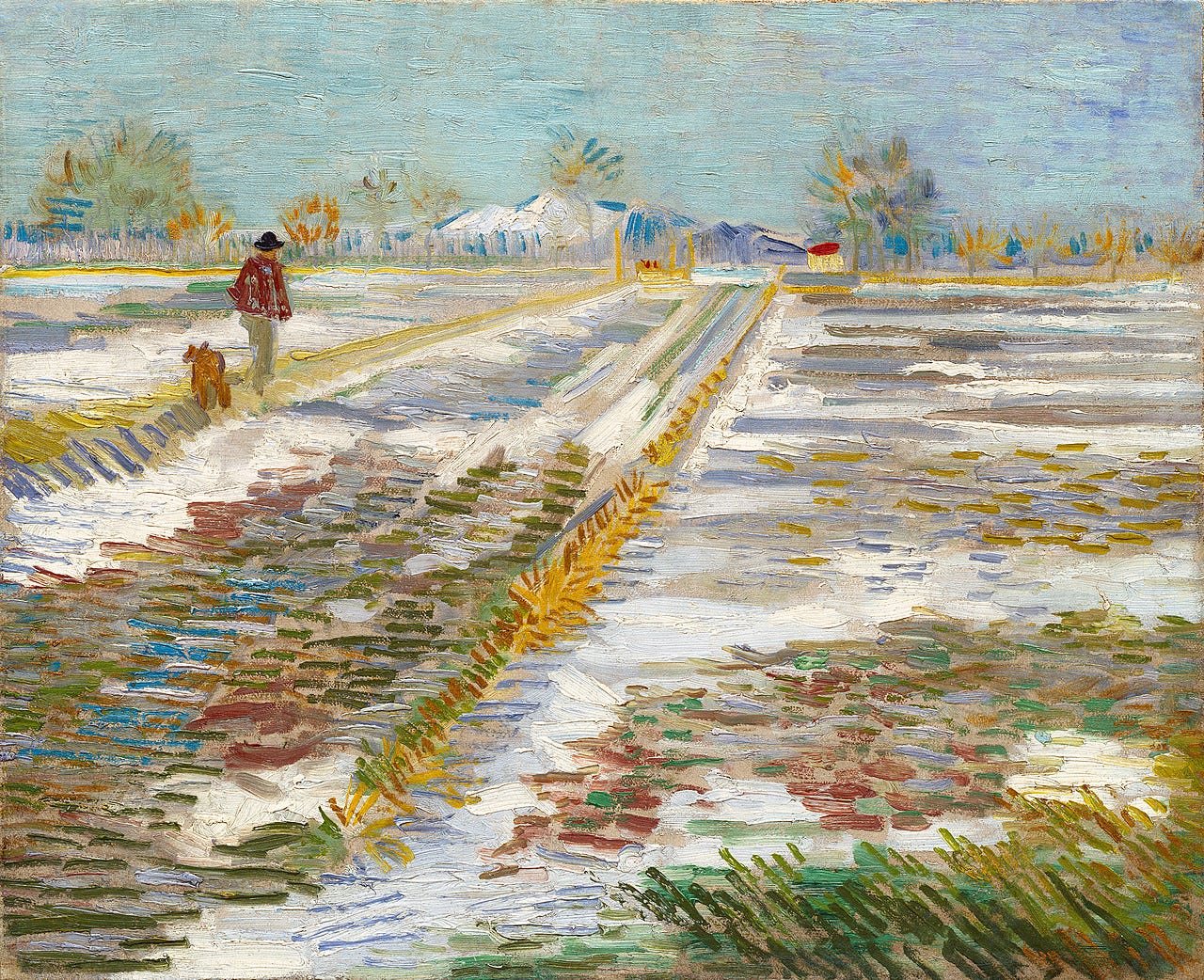The Seasons flit—I’m taught— Without the Snow's Tableau Winter, were lie—to me— Because I see—New Englandly—
—Emily Dickinson
When I was a child, I used to stand in the little mudroom at the front of our house and look out through the narrow window when it was snowing, imagining I was in an elevator going up, up, up—straight up to God. Everything was so soft, so muffled, the light was so diffuse and cold and beautiful, and out of that mass of grey which the sky had become, how wonderful it was to pick out the bits of white as they fell, to be able to see for myself the fluffy texture, the conglomerations of ice and dust that they were, almost sometimes the specific shapes, and then to follow the downward trajectory of first one, then another, then another, and then to feel, with an equal jolt of pleasure and surprise, an unsteadiness in my feet, and finally to believe that it was really I who was moving, not the flakes, I who was going ever upwards and upwards, into that mysterious world of whiteness and hush.
It always felt like hours, though it could have been mere minutes—a child has no real sense of the passage of time, and it was so absorbing an experience, so immersive (not unlike the pleasure of reading), that time expanded within it and made it a world unto itself. The joy was in the looking up and never reaching. If the motion seemed to slow, it would induce a heart-plunge of panic; all would be lost, all would be forsaken, the game would end, and stillness would descend upon the world like death, whereas what I wanted was to rise like bread. A real elevator never gives you a pure, true sense of rising. You stand in a horrid little box and five seconds later, hey presto, there you are. In my snow elevator, however, I could be ensconced forever in this dream of rising, in the coziness of being in this little room where the shoes were piled up, stepping all over one another, and the coats above them frowning down, neat and orderly like matrons, and it was a joy never to reach, never to arrive, never to stop, but to go on and on for potentially ever.
The other snowy pleasure of my childhood was sledding. We had a fairly large backyard with a good hill in the corner of it, and it was always a delight to don the armor of winter—snow pants, snow boots, jacket, gloves, hat—on a weekend morning and wade out into that whiteness, dragging along my father. Again and again we would climb up the hill and then sail down, taking turns pushing one another, until our cheeks were too numb to bear it. Sometimes, tired out, I would lie down at the bottom of the hill, under the shadow of a great tree stripped bare, and make snow angels. By the time we went back inside and had taken off all our cold, wet things, my mother would have lunch ready; we accepted it with a gratitude one never knows in warm climates.
I find it hard to recall those snows now, now that we have had warm winter after warm winter, when the snow comes as an afterthought, leaving the grass exposed here and there like bundles of raw nerves. There were so many strange sunny days this past week in February; they were like dispatches from May, unexpected and disconcerting as postcards from an old lover.
Winter: the pure possibility of the blank page, the white quilt that tucked away the world and allowed it a restful sleep; winter the comforter, the blessing and the benediction, the mother’s cool hand upon the child’s fevered forehead. In our life, aren’t there moments when one longs for solitude and repose, when one wants simply to be shut away? A little shadow is necessary as a complement to light. How often have there been times when one lies awake and fretting, nervous and agitated over God knows what, only for a few hours’ good sleep to wipe the slate clean again? The world, too, needs its interiority, its snail-shell of peace. In the winter, under her blanket of snow, the earth lies dreaming of flowers and birdsong, and the irises and daffodils that emerge in the spring, the tulips and crocuses, the choruses of cheerful warblers, are the manifestations of this dream. The dream and the realization are like the palm and the back of the hand.
Snow and childhood—both have melted away. The years fall away from me like leaves from a tree, leaving me bereft. I would like a little snow to cover everything over; I would like to sleep for a long, long time—but what could be recovered in this way? The house is gone now, and the tree under which I made snow angels is gone, and the hill is smaller, and the snow no longer comes the way it used to, and the snow pants have been grown out of, and even if I were to try to relive any part of this, it would only serve to take me further from what I remember, and make that land of childhood all the more inaccessible, foreign and strange. And I don’t want to relive it, I only want the certainty of those snows again: I want winter to come as it used to, with the full force of its blizzards and bluster, with its magic wands of icicles, with its glitter sparkling under a cold sun; I want it to keep its place in the pantheon of the seasons.
That little mudroom that no longer exists—it is so far away, and so far away is that window into which the whole of my existence narrowed as I looked up and up. When I was a child, I imagined that death would be exactly like this, this rising into whiteness, the only difference being that the elevator would actually arrive at last. At last, I would know that white land towards which I had been surging; at last, I would step out into the pure, cold air; at last, I would take the hand of God.
Thank you for reading!! If you enjoyed what you read, please give this post a like, and I’d love to hear from you in the comments!







Beautiful expression of childhood memories!
It is a beautiful writing about winter and your childhood memories.